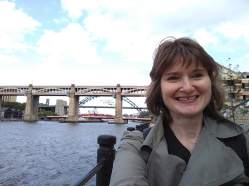Don’t be Boring
Good news: the Introduction is written. Bad news? I know it’s already out of date – but that’s okay!
 I have already reflected on the difficulty of finishing a work. But how about starting it? In many ways that’s even harder. Advice abounds on what to include or omit, the right length, the scene-setting. What exactly am I introducing? I had many doubts about whether I should have written it at all at this stage, especially as some advisors recommend leaving the introduction to the end. I have no doubt that I will rewrite the chapter many times over. But having a marker feels well worthwhile. Some advice likens the Introduction as a ‘taster’ to make the reader want to read on. In that sense, the doctoral craft is little different from any piece of writing. Don’t be boring! I keep saying to myself.
I have already reflected on the difficulty of finishing a work. But how about starting it? In many ways that’s even harder. Advice abounds on what to include or omit, the right length, the scene-setting. What exactly am I introducing? I had many doubts about whether I should have written it at all at this stage, especially as some advisors recommend leaving the introduction to the end. I have no doubt that I will rewrite the chapter many times over. But having a marker feels well worthwhile. Some advice likens the Introduction as a ‘taster’ to make the reader want to read on. In that sense, the doctoral craft is little different from any piece of writing. Don’t be boring! I keep saying to myself.
Everyone tells you that reading is the easy, pleasurable part of a thesis and writing the difficult part. How true. Some academics write quickly and well; they have a gift which manifests itself in multiple journal articles and even books. I am too much of a perfectionist really and although I write reasonably well, I spend too much time honing and refining. But it is indeed the writing, and also presenting, of the thesis where the leaps in thinking occur. I have got into better habits of writing regularly, even if it’s just a paragraph or two on what I have just been reading. So writing that introductory chapter has been really important in clarifying my thinking and getting to a point where the rationale, scope, theoretical underpinning and objectives seem to hang together in a much more satisfactory way.
Putting myself into the thesis
What are the ethical implications of researching one’s own organisation, let alone one’s own field? How will I manage to find sufficient distance from my subject matter, from people who I might know, from my knowledge base in professional practice? In my heart of hearts, I am confident that I have the right perspective but I know that it’s something I’ll need to write into the thesis in depth and be prepared to address at Viva.
My practitioner identify is something which I also realised I would need to write into the Introduction itself. So the rationale for a practitioner-academic in a doctoral thesis isn’t only about literature gaps, or researching problems in the professional field, but personal reasons surrounding career and life journey. It is this that creates the passion and perseverance needed to sustain the project.
What’s the Bullseye?
The foundations of my thesis haven’t really changed but perhaps the best thing now, three years in (can it be that long?) is that I have been able to nail my focus – or ‘bullseye’ – ‘inclusive growth’. After much mind mapping complete with the rainbow of pens; after endless doodles, notes and diagrams; after more reading (always more reading); and after a (regrettably somewhat incoherent and later retracted) draft transcript which I sent to my supervisors (well haven’t we all?!) – I saw that ‘inclusive growth’ needed to be my bullseye. The task to develop the introduction and literature review to the next stage still feels huge – but manageable.
Conferences Rule!

I have to credit the 2018 Public Administration Conference (PAC) in Northumbria University in September this year for getting me to the point of even producing my Introduction. Conferences are brilliant for forcing some half-decent writing! But these events also yield feedback from fellow academics and students, prompt reflection and usually result in some new reading sources. PAC is an informal and friendly environment, offering excellent support to doctoral students – I recommend it highly for anyone researching in the very broad field of public admin. It was also notable in introducing me to organisational ethnography. Although I love observing and analysing group dialogues, I thought that I wouldn’t have nearly enough time and resources for this kind of endeavour. It turns out that ‘ethno-lite’ may indeed be feasible.
This brings me to research methods – the elephant which lies straight ahead of me; the gateway to the intimidating business of data collection. I’ve never recorded an interview and the whole business feels pretty scary. But before I forge ahead, I need to engage in some reflection of my doctoral year.

Lots to digest in this post, Lesley, thanks for sharing.
You’ve hit the ‘bullseye’ with your comments on writing. I think any writing is better than none, and freewriting is a good practice to get into. I just need to do more of all of it and get over the fear of being critiqued which is all intended to be constructive 😬
Here’s to lots more writing in 2019.
Sandra
LikeLike
Thank you for reading Sandra and best of luck in 2019!
LikeLike